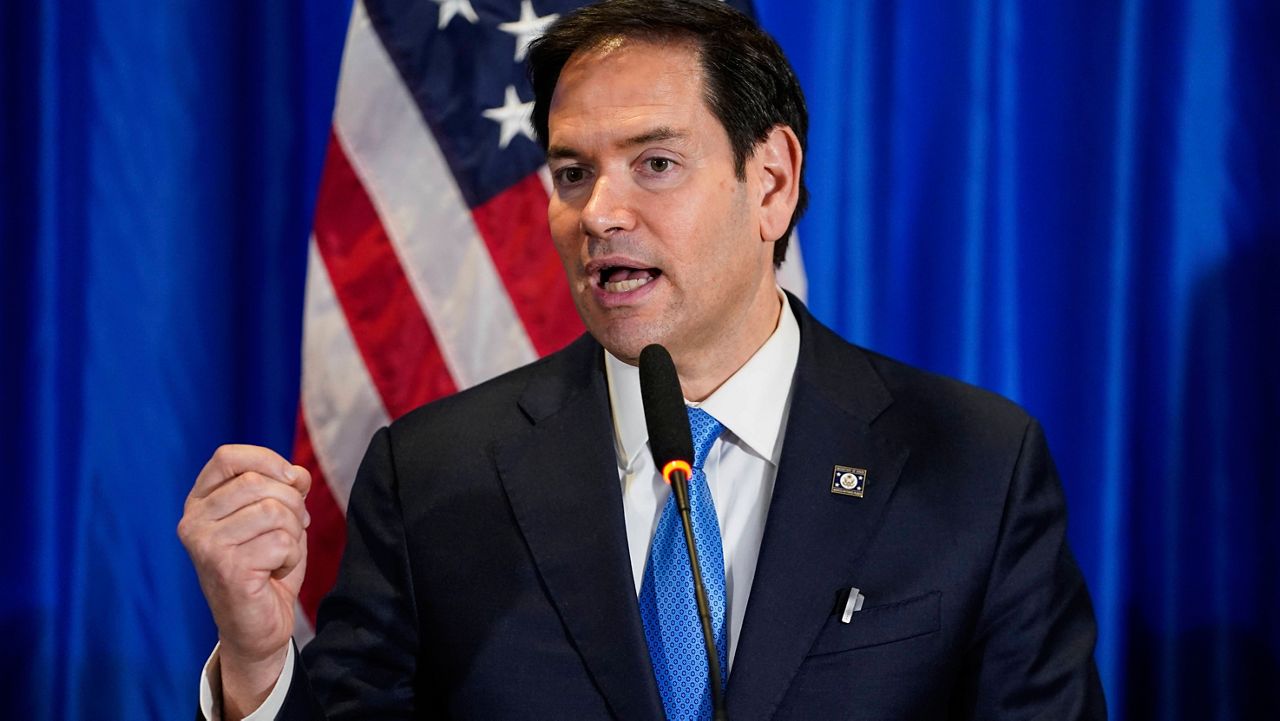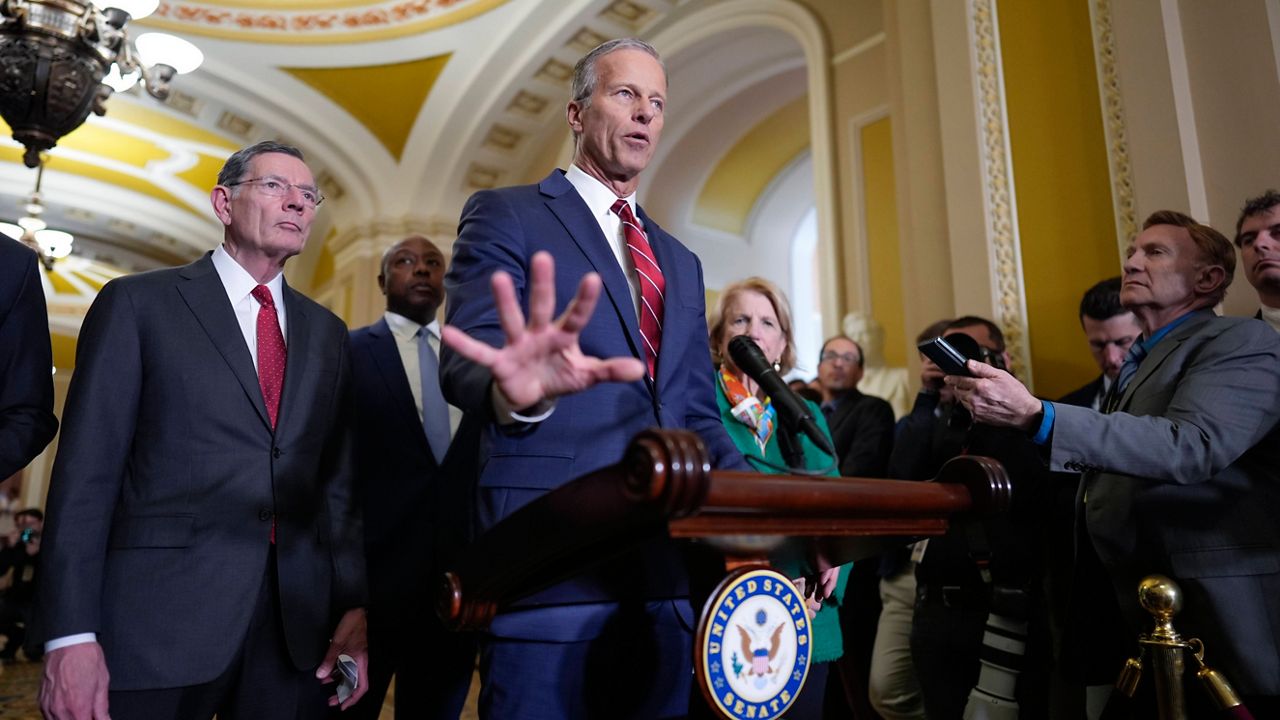Just weeks after his return to Congress after he was diagnosed with blood cancer, House Majority Leader Steve Scalise, R-La., was tapped by his fellow Republicans to serve as the next Speaker of the House over Ohio Rep. Jim Jordan.
Now comes the tricky part: Convincing a majority of the House that he's the best candidate to replace Kevin McCarthy after his historic ouster last week.
That's no easy feat, with at least 19 House Republicans saying they will not back the Louisiana Republican, according to a tally from Spectrum News.
What You Need To Know
- Republicans have nominated Rep. Steve Scalise to be the next House speaker and will now try to unite around the conservative in a floor vote to elect him after ousting Rep. Kevin McCarthy from the post
- House Republicans were set to meet behind closed doors again on Thursday to try and come to a consensus on a speaker candidate one day after Scalise narrowly defeated Ohio Rep. Jim Jordan, who chairs the House Judiciary Committee, in a 113-99 vote
- At least 15 House Republicans say they will not vote for Scalise, according to a tally from Spectrum News
- A spokesperson for Jordan confirmed to Spectrum News that the Ohio Republican offered to nominate Scalise as speaker on the House floor in a sign of unity, but it's unclear if that will sway any holdouts
House Republicans met behind closed doors again on Thursday to try and smooth out the wrinkles in an attempt to unify around one candidate one day after Scalise narrowly defeated Jordan, who chairs the House Judiciary Committee, in a 113-99 vote.
"I want to thank my House Republican colleagues for just designating me as the speaker," Scalise told reporters after the vote Wednesday. "Obviously we still have work to do. We're going to have to go upstairs on the House floor and resolve this and get the House opened again.
Scalise has been the No. 2-ranking House Republican since 2019 and part of Republican House leadership since 2014. The Louisiana Republican, who turned 58 last week, was nearly killed in 2017 when a left-wing extremist opened fire on lawmakers during a practice for the annual congressional baseball game, wounding Scalise and three others.
"We have a lot of work to do," he said. "Not just in the House for the people of this country, but we see how dangerous of a world it is and how things can change so quickly. We need to make sure we're sending a message to people all throughout the world that that the House is open and doing the people's business."
Scalise pledged that the first order of business that the House would attend to under his speakership is a bipartisan resolution introduced Tuesday by House Foreign Affairs Committee Chairman Michael McCaul, R-Texas, and Ranking Member Gregory Meeks, D-N.Y., to show support for Israel and condemn Hamas for its terrorist attacks on the country.
But with detractors mounting, there's no sense in when lawmakers will even hold a vote on a speaker, or if either candidate has enough support to move forward. After Thursday's meeting broke, Scalise was set to meet privately with GOP holdouts ahead of another possible conference meeting later that night.
Some lawmakers told Spectrum News that Scalise made little-to-no progress with holdouts in Thursday's meeting – and may have even lost votes.
"It wasn’t productive," Ohio Rep. Max Miller told Spectrum News of Thursday's meeting. "I think [Scalise] actually lost a lot more support this morning than gained, and I think we’re going to have to turn to somebody else."
Republicans, Miller said, "started leaving [the meeting] room when the speaker-designate was speaking by the droves."
Miller, who told Spectrum News on Wednesday that he's a Jordan supporter, said Thursday that his fellow Ohio Republican Jordan would have already been elected speaker.
"I think [Scalise] lost a lot of support," Miller said, adding: "Steve’s a great man. He’s an American hero and a great patriot, he’s just not the right leader for our conference right now, and I am not the only one who thinks that.“
Democrats are set to oppose the Republican nominee and remain unified to back House Minority Leader Hakeem Jeffries, D-N.Y., as they did in January during the 15 rounds of voting needed to elect McCarthy. That means that Republicans will have to unite around one candidate – or try and work with Democrats on a consensus candidate.
For his part, McCarthy is backing Scalise.
"Steve's going to have to talk to them all, see what the concerns are, but I'm supporting Steve," he said at the Capitol on Wednesday evening.
"Time is of the essence," McCarthy said Thursday of picking a speaker, but said that Scalise has "a big hill" to overcome in terms of support.
But some Republicans aren't following their former leader on this one.
“I’ve been very vocal about this over the last couple of days: I personally cannot, in good conscience, vote for someone who attended a white supremacist conference and compared himself to David Duke,” South Carolina Rep. Nancy Mace, a Jordan supporter who voted to oust McCarthy last week, said on CNN on Wednesday. “I would be doing an enormous disservice to the voters that I represent in South Carolina if I were to do that.”
"Especially given what's happening in Israel right now, I just cannot support someone who's associated with anything that divisive, whether it's race or religion," she said. "I'm just a hard pass on that."
Far-right Georgia Rep. Marjorie Taylor Greene expressed concerns about Scalise's health in a social media post: "I like Steve Scalise, and I like him so much that I want to see him defeat cancer more than sacrifice his health in the most difficult position in Congress."
Former President Donald Trump, who endorsed Jordan while also flirting with the idea of being speaker himself, expressed a similar sentiment to Greene.
"I like Steve, I like both of [the speaker candidates] very much," Trump said on Fox News host Brian Kilmeade’s radio show. "But the problem ... Steve is a man that is in serious trouble from the standpoint of his cancer. I mean, he’s got to get better."
"This is tremendous stress, all of the things that you hear about, and you know, things that you don’t want to get involved in from the standpoint of getting well," Trump continued. "He was going through very, very serious cancer therapy. He’s got a very serious form of cancer, and ... most importantly, I want Steve to get well. I just don’t know how you can do the job when you have such a serious problem."
Trump added that he will "certainly be with anybody that [Republicans] pick" as speaker, but said Scalise has "got to get well, he’s got to get strong."
Texas Rep. Troy Nehls said he doesn't think Scalise can get to the 217 votes needed to become speaker.
"I don't think he can," he said. "I've talked to some who said they're not voting for him, they're not, they're never ... it's an impossible job right now when you have a four-seat majority."
"We had 2 great candidates," he added. "I don't think either one of them can get to 217."
A spokesperson for Jordan confirmed to Spectrum News that the Ohio Republican offered to nominate Scalise as speaker on the House floor in a sign of unity, but it's unclear if that will sway any holdouts.
"We need to come together and support Steve," Jordan said.
The House is entering its second week without a speaker and is essentially unable to function, and the political pressure increasingly is on Republicans to reverse course, reassert majority control and govern in Congress.
Action is needed to fund the government or face the threat of a federal shutdown in a month. Lawmakers also want Congress to deliver a strong statement of support for Israel in the war with Hamas, but a bipartisan resolution has been sidelined by the stalemate in the House. The White House is expected to soon ask for money for Israel, Ukraine and the backfill of the U.S. weapons stockpile.
Spectrum News' Taylor Popielarz and Cassie Semyon contributed to this report.
The Associated Press contributed to this report.









